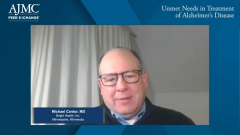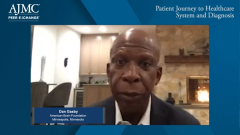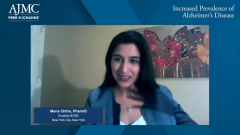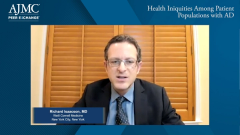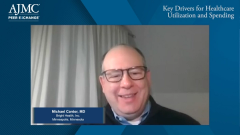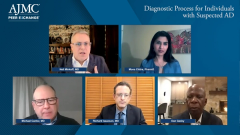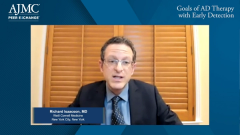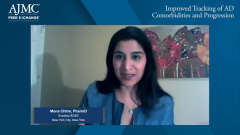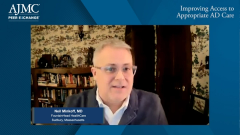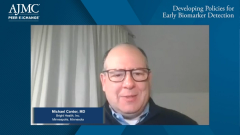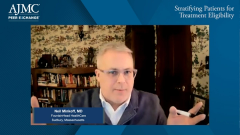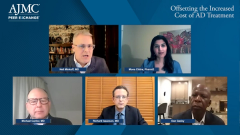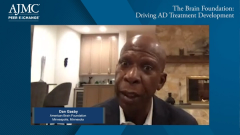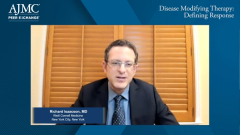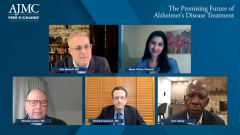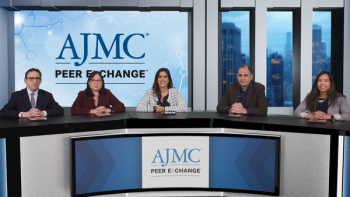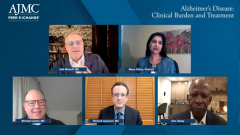
Key Drivers for Health Care Utilization and Spending
Key opinion leaders discuss which factors contribute to patients and caregivers deciding to seek health care guidance and assistance for Alzheimer disease.
Episodes in this series

Neil Minkoff, MD: One of the questions I wanted to raise based on that is that the population is expanding. Mona told us about the expansion of the number of families and number of patients who are going to be diagnosed and go through this journey. I wanted to ask a question first to Dr Cantor: What are we going to do as a health care system? Are we prepared for this increase in need for diagnosis, understanding the resources? There is a big familial component to supporting the caregiver. How are you at Excellus BlueCross BlueShield and Bright Health thinking about the future and how we are going to handle influx in patients with Alzheimer disease and their treatment and diagnosis?
Mona Chitre, PharmD: It is definitely on our radar [at Excellus]. We are thinking about it in a number of ways. First, we know this from what was previously mentioned: the societal stress and the caregiver stress. If we think just about pure claims costs, the costs for Alzheimer disease are across the continuum but not terribly high in 1 section, whether it is drug costs and long-term-care costs or whether it is not managing your chronic condition because you forgot to take your medication. So you do not have that support. Right now, from a cost perspective, it is spread across various levers.
From our health care system perspective, I would say that we want to be supportive. We want to be 1 cog in the wheel as we think about expansion of providers, assurance of appropriate diagnostics, and appropriation of drugs to the patients at the right time. We are also thinking about unique things like benefit design, so we have supplemental benefits through Medicare that we can offer to those beneficiaries. This can include transportation support, memory aids, and food support. We are thinking from a benefit design perspective about how we help the caregivers as well as the patients in this challenging diagnosis. We are thinking about it from all levers, Neil: the capacity and the clinical but also from the product development and benefit sides.
Neil Minkoff, MD: Mike?
Michael Cantor, MD: I am going to agree. One of the aspects of this is that our health care workforce in aging—Alzheimer disease is an aging-related disease—is unprepared. We do not have enough geriatricians, we do not have enough geriatric psychiatrists, and we do not have enough behavioral neurologists. You pick. Those are the medical specialties. It is the same issue with having nurses who are good at managing people with Alzheimer disease and other dementia. Even informal caregivers need training; the family needs training. We are not ready, and it is not occupying the front of our mind. Right now, COVID-19 [coronavirus disease 2019] is the most obvious thing that is in the front of our mind. COVID-19 has not made Alzheimer disease or dementia care worse. It has uncovered what most of us have known for a long time, which is the inadequate focus, resources, training, and expertise. That is true whether it is diagnosis and therapy, or whether it is training caregivers or being a caregiver.
There is a big gap when it comes to dementia, like many aging-specific illnesses. Falls, incontinence, and all these things go back to a lack of resources focused on caring for older adults and the most common problems they have. That is changing. It is shifting as baby boomers age. Baby boomers tend to be the path setters and leaders in our society. They have been for 50, 60 years. That is not changing. We are going to see more of that. As they get older, they are going to make more demands. They are not going to accept the way that we have done things in the past, and they are going to insist that we do a better job, which is not only helpful in Alzheimer disease; it is about time.
In terms of the health plan perspective, what has been happening recently is that the shifting of people into Medicare Advantage programs is accelerating the need for health plans to understand that they have to focus on issues like dementia, falls, incontinence, and polypharmacy because all those things end up having higher medical cost, lower quality, and worse patient experiences. There will be situations with providers who feel like they are unprepared and unable to help people who need their help and are trying to get help from them.
The health plans, as we have heard, are focusing on what supplemental benefits they can put in place. The health plans are in a unique position of being able to design benefits packages that address the more specific problems in Alzheimer disease. I have done some work in the past on Alzheimer disease and driving. It is a huge problem for people to give up their license. It is easier if you know your health plan is going to pay for you to go back and forth to your doctor or to get what you need from the grocery store, so you do not have to do that anymore. You do not have to drive; someone will come pick you up to take you there and then be there when you are done to take you back home. Those are newer developments that health plans are beginning to pay for.
There is also respite care. The caregivers are exhausted. Having the opportunity for a health plan to pay for someone else to come into the home a couple of hours a week is a huge deal for someone who is trying to manage the care of someone with dementia 24-7. Similarly, a couple of days in a long-term-care facility, or a skilled nursing facility with a respite area so that the caregivers can have more of a full break and a vacation can be impactful. Unfortunately, many caregivers are themselves older and sick, so if you need a knee replacement or you need a procedure, and are a full-time caregiver for someone, it could be hard to get that. If you do not take care of yourself, then you cannot take care of anybody else.
Health plans are beginning to understand those benefits designs, along with the creation of special-needs plans. These are Medicare Advantage models that focus specifically on people with certain chronic illnesses. Dementia is 1 of those chronic illnesses for which health plans can design specific packages of benefits and provide better care for patients and support for caregivers. Once COVID-19 begins to recede a bit, we are going to continue to see an acceleration and improvement in how we take care of people with dementia and their families with the benefit designs that are going to make that possible.
Neil Minkoff, MD: We have touched a bit on commercial insurance and on Medicare and Medicare Advantage, but with Medicaid, are we having that same conversation for our safety net programs where one would believe there would be a disproportionate amount of exposure?
Michael Cantor, MD: The issue with Medicaid is that it pays for long-term care, and dementia is 1 of the major drivers of people going into institutional long-term care and requiring community-based long-term care. It is called Long-Term Service & Supports. Those costs continue to go up rapidly because the cost of providing those services is more expensive year over year. Plus, as Mona mentioned, we have a baby boomer generation. Every year, there are more people who are older. Every time you have an increase in the aging population, you are going to have more people with dementia. In Medicaid programs, about two-thirds of the Medicaid budget goes to pay for long-term care, so the issues of dementia and Medicaid programs are intertwined.
Interestingly, I am a bit biased, but my observation has been that the long-term-care part of Medicaid tends to get less attention than Medicaid expansion and some of the other more politically hot topics. From a dollars-and-cents perspective, it is all about long-term care and long-term-care insurance that was passed in the late 1980s. It would have provided a lot of care and support, but it was repealed. Congress has been unwilling to touch that because older adults were so angry over means-tested Medicare and long-term-care insurance that no one wants to go back to that. We are rapidly heading toward that day of reckoning though when we are going to have to, at the state and federal levels, get policy makers to return to this topic and figure out how we are going to pay for long-term care. Otherwise, we are going to continue to be muddling through as we have seen today. A lot of people are ending up in situations that are not tenable in terms of basic living.
Dan Gasby: One of the most important things that helped me through was having a long-term-care plan. We live in a country where we have to market everything. We market health, and we certainly market access to wealth, but we have to do a better job. The insurance companies and the whole health profession need to get young people to understand that, just as we expanded the base of basic health care, we must expand the base of long-term care so that more people sign up earlier.
We need to explain to them what happens and real-life stories of what could happen. You may not be married. You may be divorced. Your children may leave you. It is time to have real conversations about the realities of life. What do you do if you get sick? Who is going to take care of you? Where are you going to go? It is time to have that kind of marketing to let people know that you could get in at age 30 or 25 and pay so little that it is not a burden on you. Make it part of the overall health package and your portfolio for wealth for the future. We need to do a better job telling people, especially young people, that you are on your own. And if you are on your own, then you are going to need to have something that is going to be a backstop, and long-term care is that backstop.
Transcript edited for clarity.
Newsletter
Stay ahead of policy, cost, and value—subscribe to AJMC for expert insights at the intersection of clinical care and health economics.
